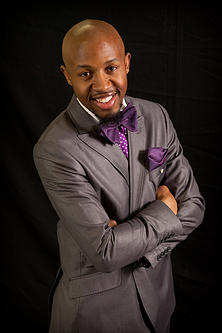What is the role of religion in addressing Ferguson, and all it represents? How can the church respond?
Who better to raise those questions, and begin to answer them, than Carlton R. Lee, the pastor to Michael Brown, Sr.? Lee came to YDS last week to speak to the community and help it grapple with the religious dimensions of the fatal police shooting of a young unarmed black man in Missouri and the subsequent outcry.
 The best place to begin “is by giving an honest account of [historical] events,” said Lee, founder of the Flood Christian Church, which is where the father of the slain teenager attends. Lee’s church was destroyed by fire in the rioting that ensued after a grand jury decision not to indict the white police officer who shot Brown.
The best place to begin “is by giving an honest account of [historical] events,” said Lee, founder of the Flood Christian Church, which is where the father of the slain teenager attends. Lee’s church was destroyed by fire in the rioting that ensued after a grand jury decision not to indict the white police officer who shot Brown.
In his public address in H. Richard Niebuhr Hall on Jan. 21, Lee equated the death of Michael Brown, Jr., with “a modern-day public lynching.” Lee pointed out that Brown’s body was left uncovered after he was shot, against standard procedure; a police officer was observed standing on top of the dead body; and the parents were not allowed to identify the body for two weeks. All this, Lee argued, resonates with the historic specter of lynching.
“Could it be that we aren’t just yet delivered from the injustice of the past?” he asked.
In his introductory remarks, Dean Greg Sterling invoked the emotional burden of the jury’s decision, likening it to other historical tragedies that linger in public memory. “Some events are seared on our minds,” he said. “I think we all will remember exactly where we were when the grand jury decision [in Ferguson] was announced.”
Lee’s address was followed by a community discussion moderated by Frank Roberts ’16 M.A.R., who has traveled to Ferguson on multiple occasions and has engaged race dynamics in the U.S. as an activist and writer. Roberts asserted that religion as an academic field has a role to play in explaining America’s racial politics. “We have to contend with the situational ethics of Ferguson,” Roberts said.
Roberts challenged the audience to think critically about the language and ethics of what we normally think of as “looting.” The looting could be regarded as part of a repertoire of resistance tactics, Roberts suggested, urging further scholarship on the matter.
Picking up on Roberts’ point, Lee suggested that violence takes many complex forms and needs interpretation. Beyond the high-profile physical violence of police against people of color, Lee cited the violence of systemic poverty and inequality of opportunity.
Quoting Matt. 8:18, where Jesus encouraged a selfless commitment to community, Lee said violence and injustice compel a prophetic response from the church—one based on the Christian ethic of love.
One student, Steven Richards ’17 M.Div., responded by reporting on ways in which Yale students are engaging the issues raised by Ferguson. Richards is organizing the Gospels on Ferguson Project, a faculty, student and staff effort “to produce a scholarly, dispassionate analysis of the gospels as they might relate to Ferguson,” as it describes itself.
Other initiatives on campus have included two prayer vigils hosted by Yale Black Seminarians, one following the death of Michael Brown and the other after the grand jury’s decision not to indict the police officer; Marquand Chapel’s creation of a liturgy around the events in Ferguson; YDS students’ marching with protesters in New Haven and New York in the Black Life Matters movement (some, like Roberts, even traveling to Ferguson); and “Taboo Talks” at Berkeley Divinity School to discuss how to foster greater diversity at Yale.
One white student, Greg Williams ‘15 M.Div., an activist with the Catholic Worker Movement, shared his frustrations with racial divisions around nonviolence and underscored the need for unity within the church. Sometimes it appears as though there is a divide between black and white activists on the question of civil disobedience, Williams noted. “At least in this country,” he said, “nonviolence [only] gets raised when we want to put peace in front of justice.” Williams urged a new vision for engaging racial tension in America through shared religious traditions.
Candid conversations may be difficult, but they are enormously important, Lee said. “Anytime a people have been oppressed for a long time, they get tired,” he said, “…however, we need to start having real-life conversations about everything.”
Cecil Tengatenga is a second-year M.Div. student with a special interest in the intersection of spirituality, health and science. He hopes to pursue a career in health care.